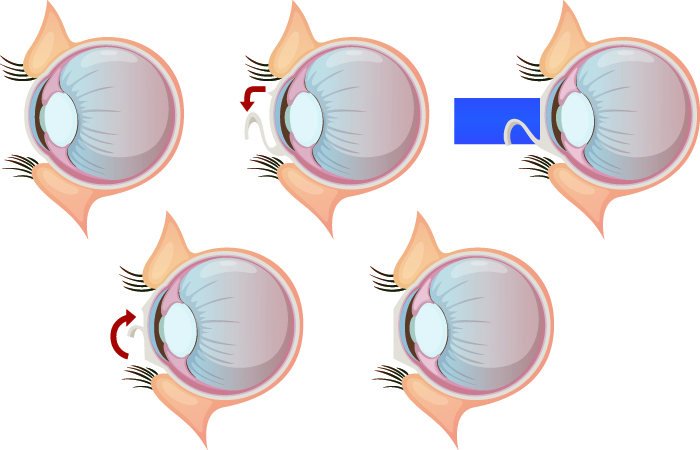Corneal Surgery in Chirag Enclave, Delhi
The cornea is the clear surface of the eye that controls light entering the eye. It may be damaged due to various reasons and a transplant is required to restore vision.
The success of a corneal transplant depends on the cause of the damage, the surgical method, expertise of the surgeon, chance of rejection and various other factors.
If you experience redness in the eye, swollen eye or vision loss, visit the nearest corneal detachment hospital in Delhi and get a headstart on the treatment.
What is corneal surgery?
Corneal surgery is a surgical procedure that removes the damaged part of the cornea and replaces it with a healthy donor cornea. A corneal detachment specialist in Chirag Enclave, Delhi, uses a little circular blade to remove the damaged tissue of the cornea and replaces it with a healthy donor cornea tissue of the same shape.
Some corneal surgeries use sutures to keep the new cornea in place; others use an air bubble to keep the cornea intact.

Who is qualified for performing corneal surgery?
An ophthalmologist who specializes in treating the cornea performs corneal surgery. Since the procedure uses anesthesia, a doctor with a specialization in cornea must perform the surgery.
Why is corneal surgery performed?
Corneal surgery is often performed to improve vision if you have a damaged cornea. It treats various conditions that include:
- Keratoconus (a condition in which the cornea bulges outward)
- Fuchs’ dystrophy (degeneration of the innermost layer of the cornea)
- Thinning of the cornea
- Cornea swelling
- Cornea scarring
- Corneal ulcers
- Complications caused by previous eye surgery
What are the different types of corneal surgery?
There are four types of corneal surgery. Your surgeon may decide which method to use depending on the cause of the damage to the cornea.
- Penetrating keratoplasty (PK): It involves a full-thickness cornea transplant. In this procedure, your surgeon removes the entire central part of the damaged cornea and replaces it with a healthy donor cornea. Stitches are used to fix the new cornea into place.
- Endothelial keratoplasty (EK): This surgery is employed if the innermost layer of your cornea is damaged. There are two types of EK surgeries -
- DSAEK (Descemet stripping automated endothelial keratoplasty)
- DMEK (Descemet membrane endothelial keratoplasty)
- Both the procedures remove and replace the damaged endothelial tissue with healthy donor tissue. The only difference between DSAEK and DMEK is the thickness of the donor cornea. DSAEK is thicker while the latter is thin.
- Unlike other keratoplasty surgeries, EK is a non-invasive procedure. Instead of sutures, an air bubble is used to keep the cornea in place.
- Anterior lamellar keratoplasty (ALK): ALK is used if the innermost layer of your cornea is healthy, but the outer and the middle layers are damaged. In this procedure, the surgeon removes the damaged layers and replaces them with healthy donor tissues.
- Keratoprosthesis (artificial cornea transplant): In some cases, the patients are not eligible for a cornea transplant from a donor cornea. In such cases, they receive an artificial cornea. This method is known as keratoprosthesis.
Consult a corneal detachment specialist in Delhi before you opt for any surgical procedure.
What are the benefits of corneal surgery?
The main benefit of corneal surgery is that it restores vision of people who are in danger of losing vision. It alleviates pain and improves the appearance of diseased/damaged cornea. The surgery also helps people with keratoconus and Fuchs’ dystrophy.
What are the risks associated with corneal surgery?
Though corneal surgery is a relatively safe procedure, it poses certain risks that include:
- Eye infection
- Bleeding
- Swelling
- Cataracts (clouding of the lens)
- Glaucoma (increased pressure in the eyeball)
- Retinal detachment
- Rejection of the donor cornea (might cause severe complications like vision loss, pain, red eyes and sensitivity to light)
Conclusion
If you experience any complication after the surgery, visit a corneal detachment specialist in Delhi. Request an appointment at Apollo Spectra Hospitals, ChiragEnclave, Delhi. Call 1860 500 2244 to book an appointment.
You will be in the operation theatre for 1-2 hours, but the procedure itself takes a shorter time.
You can drive after 24 hours when the effect of the anesthetic is gone. However, your surgeon may recommend you wait until your follow-up examination.
Your surgeon may recommend a corneal transplant if you are diagnosed with keratoconus (bulging cornea). You might also need a transplant if your cornea is swollen, scarred or has developed ulcers.
Symptoms
Our Doctors
DR. MRIDULA MEHTA
MBBS, MS - Ophthalmo...
| Experience | : | 22 Yeras Experience |
|---|---|---|
| Speciality | : | Ophthalmology... | Location | : | Chirag Enclave |
| Timings | : | Mon to Sat : 10:00 A... |
Our Top Specialities
NOTICE BOARD
CONTACT US
CONTACT US
 Book Appointment
Book Appointment



.svg)
.svg)
.svg)
.svg)








